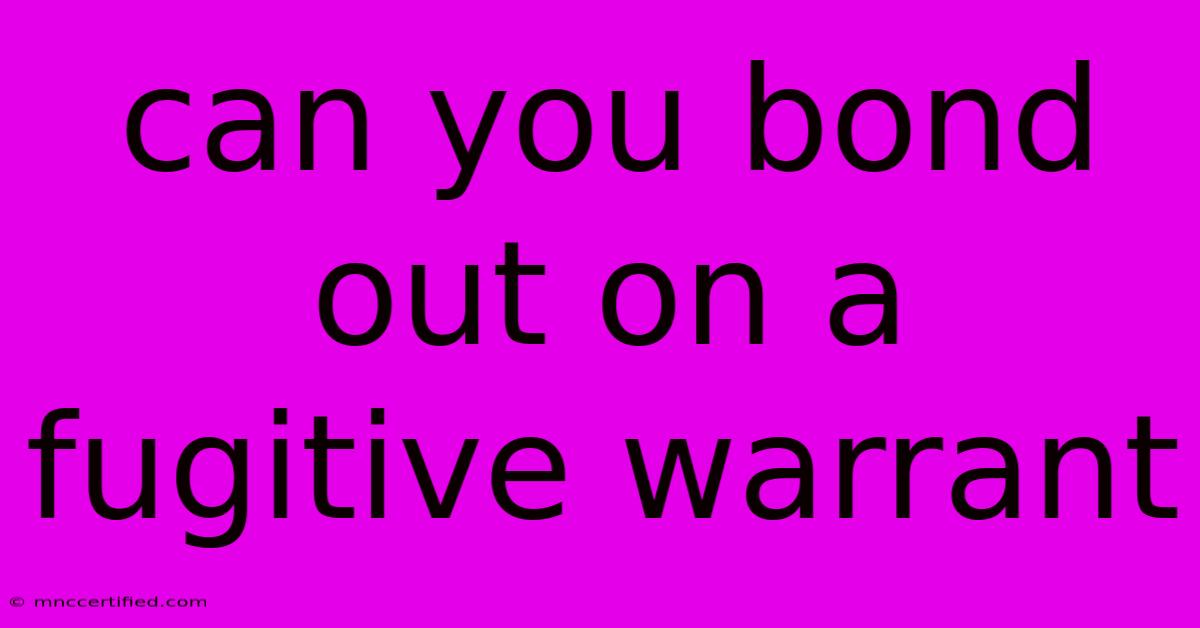Can You Bond Out On A Fugitive Warrant

Table of Contents
Can You Bond Out on a Fugitive Warrant? Navigating the Legal Maze
Being accused of a crime is a stressful situation, and a fugitive warrant only amplifies the pressure. This legal document essentially labels you as someone who has evaded the justice system, making it even more challenging to navigate the legal process. A common question that arises is: can you bond out on a fugitive warrant?
The answer, unfortunately, is not simple. It depends on several factors, including:
- The severity of the original crime: More serious charges, like violent offenses, are less likely to be eligible for bail.
- The jurisdiction: Each state and federal court has its own set of rules and regulations regarding fugitive warrants.
- The individual's criminal history: Previous convictions or a history of fleeing from the law can negatively impact bond eligibility.
- The risk of flight: The court will assess the likelihood of the individual fleeing again if released.
What is a Fugitive Warrant?
A fugitive warrant is issued by a court when a person fails to appear for a court date or fails to comply with a court order. It essentially authorizes law enforcement to apprehend the individual and bring them before the court.
The Challenges of Bonding Out
Bonding out on a fugitive warrant is often more difficult than regular bail. Courts are more hesitant to release individuals accused of fleeing, as they are perceived as a higher flight risk.
Here's why it can be difficult:
- Increased bail amount: The court may set a significantly higher bail amount to deter flight.
- Stricter conditions: If bail is granted, it may be subject to strict conditions, such as:
- House arrest: Requiring the individual to remain at home with electronic monitoring.
- Travel restrictions: Limiting the individual's ability to leave the jurisdiction.
- Surrender of passport: Preventing the individual from leaving the country.
- Increased scrutiny: The court will scrutinize the individual's background and circumstances to determine if they pose a flight risk.
Seeking Legal Counsel
If you're facing a fugitive warrant, the best course of action is to consult with a criminal defense attorney immediately. They can:
- Assess your situation: Understand the charges against you and the potential legal consequences.
- Negotiate with the court: Advocate for a reasonable bail amount and less restrictive conditions.
- Explore options for surrender: Guide you through the process of voluntarily surrendering to the authorities.
- Protect your rights: Ensure that your rights are not violated during the legal process.
Important Considerations
- Understanding the risks: It's essential to understand that bonding out on a fugitive warrant doesn't erase the original charges. You'll still need to face the legal consequences of the underlying crime.
- Compliance with bail conditions: If you are released on bail, strictly adhere to the terms and conditions set by the court. Any violation could lead to the revocation of your bail and your return to custody.
Finding a Lawyer
Finding the right criminal defense attorney is crucial. Consider these factors:
- Experience: Look for an attorney with experience in handling fugitive warrant cases.
- Reputation: Research the attorney's reputation and track record of success.
- Communication: Choose an attorney you feel comfortable communicating with and who will keep you informed throughout the process.
Conclusion
Facing a fugitive warrant is a serious matter. Seek legal advice from a qualified criminal defense attorney to navigate the complexities of the legal system and protect your rights. Remember, understanding your legal options and taking proactive steps can help you navigate this challenging situation more effectively.

Thank you for visiting our website wich cover about Can You Bond Out On A Fugitive Warrant. We hope the information provided has been useful to you. Feel free to contact us if you have any questions or need further assistance. See you next time and dont miss to bookmark.
Featured Posts
-
Rugby Rankings All Blacks Move Closer To Top Spot
Nov 09, 2024
-
Graham Norton Show Guests And Music Tonight
Nov 09, 2024
-
Financial Assistance For Car Insurance
Nov 09, 2024
-
Crypto Loko No Deposit Bonus Free Chip
Nov 09, 2024
-
Security Increased In Amsterdam After Football Violence
Nov 09, 2024